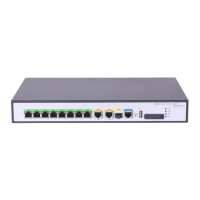452
Syntax
userlog flow export [ vpn-instance vpn-instance-name ] host { hostname | ipv4-address | ipv6
ipv6-address } port udp-port
undo userlog flow export [ vpn-instance vpn-instance-name ] host { hostname | ipv4-address |
ipv6 ipv6-address }
Default
No log hosts are specified.
Views
System view
Predefined user roles
network-admin
Parameters
vpn-instance vpn-instance-name: Specifies an MPLS L3VPN instance by its name, a
case-sensitive string of 1 to 31 characters. If the log host is on the public network, do not specify this
option.
hostname: Specifies a log host by its name, a case-insensitive string of 1 to 253 characters. The host
name can contain letters, digits, and special characters including hyphen (-), underscore (_), and dot
(.).
ipv4-address: Specifies a log host by its IPv4 address. The address must be a valid unicast address
and cannot be a loopback address.
ipv6 ipv6-address: Specifies a log host by its IPv6 address.
port udp-port: Specifies the UDP port number of the log host, in the range of 1 to 65535. As a best
practice, use UDP port numbers in the range 1025 to 65535 to avoid collision with well-known UDP
port numbers.
Examples
# Export flow log entries to UDP port 2000 on the log host at 1.2.3.6.
<Sysname> system-view
[Sysname] userlog flow export host 1.2.3.6 port 2000
Related commands
display userlog export
userlog flow export load-balancing
Use userlog flow export load-balancing to enable load balancing for flow log entries.
Use undo userlog flow export load-balancing to restore the default.
Syntax
userlog flow export load-balancing
undo userlog flow export load-balancing
Default
Load balancing is disabled. The device sends a copy of each flow log entry to all available log hosts.
Views
System view
